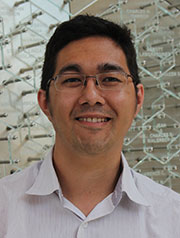 Jason Kwan, assistant professor, Pharmaceutical Sciences Division, has been awarded a research starter grant by The American Society of Pharmacognosy (ASP) for the investigation of novel biofilm inhibitors made by symbiotic bacteria living in marine sponges.
Jason Kwan, assistant professor, Pharmaceutical Sciences Division, has been awarded a research starter grant by The American Society of Pharmacognosy (ASP) for the investigation of novel biofilm inhibitors made by symbiotic bacteria living in marine sponges.
Sponges are simple invertebrates that rely on a complex assemblage of bacterial associates to produce small molecules that protect against predation and, perhaps, infection. As the majority of sponge symbionts are difficult to isolate and grow in the laboratory, culture-independent methods must be used, for example the direct sequencing of DNA derived from the sponge and bacterial community, a technique called metagenomics. The project will rely on bioinformatics methods developed by Dr. Kwan’s lab to extract individual bacterial genomes from sequencing data, and to track the expression of pathways that make small molecules in response to incoming sponge pathogens. Upregulated compounds may prevent colonization of the large internal surface area of the filter-feeding sponge by incoming bacteria, and these compounds will be screened for anti-biofilm activity. Biofilms are formed by bacteria associated with surfaces, and they are found in many clinical infections. As bacteria in biofilms are generally resistant to antibiotics, there is a need for effective treatments that target biofilms specifically.
The ASP Research Starter Grants are small research grants available for active members in the first eight years after earning their PhD and in the first five years of their first independent career position. Kwan received the award at the 2015 ASP Annual Meeting held in Copper Mountain, Colo. in July.
Kwan’s research interests include the role of uncultured symbionts in natural product biosynthesis within marine invertebrates; marine natural products chemistry; drug discovery; next-generation sequencing; metagenomics; bioinformatics; biosynthesis. He joined the faculty at School of Pharmacy in 2013.